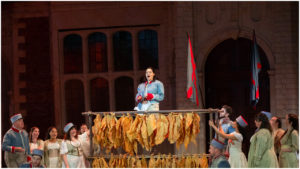
Opera Holland Park 2022 Review: Carmen
Cecilia Stinton’s Unfussy New Production Tells the Story with Clarity
By Benjamin Poore(Photo credit: Ali Wright)
Georges Bizet’s “Carmen,” after the novella by Prosper Mérimée, is a piece that presents plenty of challenges to audiences today. Some are owing to problematic aspects of the text – stereotyped depictions of the Gypsies in the piece, the spectacle of a murdered woman crowning the action – and others simply the weight of tradition and cliche (smoldering fantasies of dark-haired Spanish beauties; donkeys; bust-boosting corsets; sherry-soaked smugglers straight out of a pulp novel) which tend to blunt the opera’s elemental feel for human drives.
Adventurous directors have even made moves to subvert the opera’s murderous conclusion – Barrie Kosky’s recent production at the Royal Opera House sees the heroine leap up at the last moment with a wry shrug; Dmitri Tcherniakov’s production for the Aix festival boldly reframes the opera as an immersive playacting couples therapy.
Plenty of Invention
Cecilia Stinton’s new production for the Opera Holland Park 2022 season doesn’t go that far by any stretch, but there is still plenty of invention. The setting is fairly traditional, with naturalistic costumes and recognizably Andalusian gates, grills, and props; lighting is mostly understated and designs don’t drip with trashy exaggeration. We are wrong-footed when the sultry beauty who we assume to be the titular heroine turns out not to be at all; Carmen herself wears riding boots and trousers, and saunters about the giving as good as she gets.
She is not cowed by Don José’s tempers or threats even if (traditionally) she is ultimately killed by him, in brilliantly realized final scene – one of the few times the more intimate downstage space is deployed in the show, as well as in a breathtakingly atmospheric card trio. More often it is he who is in pieces while she pursues her own ends.
Holland Park have retained their pandemic-friendly theatre design from last season – an airy space made from reclaimed wood and furniture from Greek designer takis – with orchestra placed in a central pit; most of the action takes place behind them, with occasional – and well-judged forays – the downstage platform in front. The openness of the space favors chorus-heavy operas like “Carmen,” and the forces of children’s chorus, soldiers, smugglers, and factory girls are well-marshaled across the show, with neatly-studied bits of interaction and detailing giving the drama a lived-in feel. The French dialogue – thoughtfully shorn a little – could probably do with a bit more polish, but when sung the language more than passes muster.
Growing Talents
Holland Park is always a good place to spot new and growing talents, and a well-calibrated cast was in impressive form. Kezia Bienek takes the title role. Her instrument is effulgent, with just enough bite to show that it’s her who calls the shots; her vibrato is warm and narrow enough for great clarity of intonation and phrasing, especially in her sinuous singing at Don José in act one. Low notes gleamed darkly, such as in a burnished “la mort” in the card trio.
Her sometime lover Don José was sung by tenor Oliver Johnson. His Flower Song was delicately contoured, with especially nice shading coming from a feather-soft head voice. His final cry of rage and despair at the climax of the opera, as he is dragged away, was hair-raising.
Baritone Thomas Mole also impressed as Escamillo with peerless top Fs and Es in the Act two showpiece; it is a voice with plenty of darkness and depth across the whole register, losing none of its interest in the upper reaches, and gives his boyish, playful characterization real charisma.
Alison Langer’s Micaëla was a treat indeed, duetting rapturously with Johnson in Act one and thrilling with some spellbinding soft singing later in the opera.
Jacob Phillips brought a less bullish, more lithe, swagger to the role of Zuniga both vocally and physically, in a refreshing change to the usual characterization. Holland Park regular Natasha Agarwal sang Frasquita alongside Ellie Edmonds’ Mercédès, both of them brighter and fiercer foils to Bieneck’s Carmen; a brilliant touch in the final scene sees Edmonds stepping in to desperately try and save Carmen and fight off Don José, which almost succeeds, and Carmen dies in her arms.
Lee Reynolds makes his conducting debut at Holland Park in this production, in a breakneck account of the score; notwithstanding a couple of fumbles in the brass and some coordinated strings at the outset, the City of London Sinfonia matched Reynolds’ energy with panache and daring, especially in a frisky Act four prelude. It’s thrilling stuff, but sometimes a little more repose would’ve been welcome – the Act three entr’acte featured sumptuous playing but wanted for a little more space; “Les tringles des sistres tintaient” could also have come up to the boil in a more sustained way.
The Holland Park chorus is on the slighter side but still made an empathic presence felt in the big space, especially in the Act four sequences; perhaps the most sprightly singing of all came from the brilliant children’s chorus from Cardinal Vaughan Memorial School, who attacked the music with bite and vigor. A promising opening to the Holland Park 2022 season, and a superb introduction to the opera.


